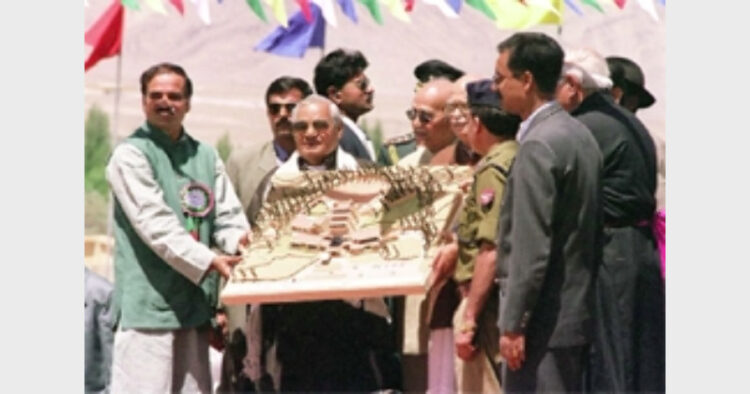Intro: The Ministry of Tourism prepared a draft on National Tourism Development Policy with the objective of positioning tourism as a major engine of economic growth.
A National Policy on tourism highlighting the importance of the sector and the objectives of tourism development in the country was presented in the Parliament in 1982. The policy was formulated in an environment of a closed economy with rigid licensing procedures. The policy did not emphasize the role of private sector, and foreign investment was not envisaged. The policy also did not lay adequate emphasis on domestic tourism and the need for product development. ln the Chief Ministers’ Conference held on October 30, 2001, the Prime Minister of India, Shri Atal Behari Vajpayee had stated:
“Tourism is a major engine of economic growth in most parts of the world. Several countries have transformed their economies using the tourism potential the fullest. Tourism has great capacity to create large scale employment of diverse kind – from the most specialised to the unskilled and all of us know that generation of massive productive employment opportunities is what India needs the most”.
The Ministry of Tourism had prepared a draft National Tourism Development Policy with the objective of positioning tourism as a major engine of economic growth and to harness its direct and multiplier effects for employment and poverty eradication in an environmentally sustainable manner.
This draft was circulated to all the stakeholders in the Totuism sector, the Private sector, the Industry Associations, the State Governments, Departments and Ministries of Government of India. The draft on National Tourism Policy-2002 was also discussed at the three day Tourism Conclave comprising of-
a. Meeting of all foreign and domestic officers of Tourism Ministry;
b. Meeting of State Tourism Secretaries ; and
c. Meeting of the State Chief Ministers and Tourism Ministers.
The policy document seeks to enhance employment potential within the tourism sector as well as to foster economic integration through developing linkages with other sectors. Broadly the policy paper attempts to:
- Position tourism as a major engine of economic growth;
- Harness the direct and multiplier effects of tourism for employment generation, economic development and providing impetus to rural tourism;
- Focus on domestic tourism as a major driver of tourism growth.
- Position India as a global brand to take advantage of the burgeoning global travel trade and the vast untapped potential of India as a destination;
- Acknowledges the critical role of private sector with Government working as a pro-active facilitator and catalyst;
- Create and develop integrated tourism circuits based on India’s unique civilization, heritage, and culture in partnership with states, private sector and other agencies;
- Ensure that the tourist to India gets physically invigorated, mentally rejuvenated, culturally enriched, spiritually elevated and “feel India from within”.
The policy document takes into consideration seven key areas that will provide the thrust to tourism development. These are: Swagat (Welcome), Soochana (Information), Suvidha (Facilitation), Suraksha (Safety), Sahyog (Cooperation), Samrachana (Infrastructure Development), and Safai (Cleanliness.)
In Prime Minister’s Conference with Chief Ministers and Tourism Ministers on National Tourism Policy in 2014, he said, “Travel and Tourism have always been an integral part of India's tradition and culture. The maxim ‘Atithi Devo Bhava’ encapsulates the high honor and hospitality that our society accords to the guest and the traveler. For us, the benefits of tourism far transcend the immediate commercial gains, important though they are.”
Tourism knits individuals, communities, and nations. It weaves ever-new threads in the tapestry of cultures, as individuals discover new places, meet new people, construct and deconstruct impressions, and, in the best of experiences, find their lives memorably enriched.
The World Tourism Organization has rightly declared that tourism is a powerful tool for peace and dialogue amongst civilisations, an instrument that can spread international understanding and unity. The recognition of this positive potential of tourism sounds truer today, after September 11, than before.
In contrast, not only is India's share in global tourism tiny, but global arrivals are growing at a slow rate. It is a matter of both irony and concern that we have, at 3.8 million, more Indians going abroad than the 2.6 million foreigners who come to visit India.
Cleanliness is a factor that we can address with relatively the least financial cost. I have seen in the draft tourism policy that you have identified six broad areas for promotion of sustainable tourism such as Swagat (hospitality), Soochna (information), Suvidha (facilitation), Suraksha (safety), Sahyog (cooperation), and Sanrachna (infrastructure development). While congratulating the Ministry for evolving this simple six-point strategy. I would urge you to add a seventh point to it—Safai (cleanliness).
PM was pleased to inaugurate this Conference with the confidence that tourism will soon emerge as a powerful driver of India’s economic growth, employment generation, social development, and cultural renewal. —Organiser Desk














Comments